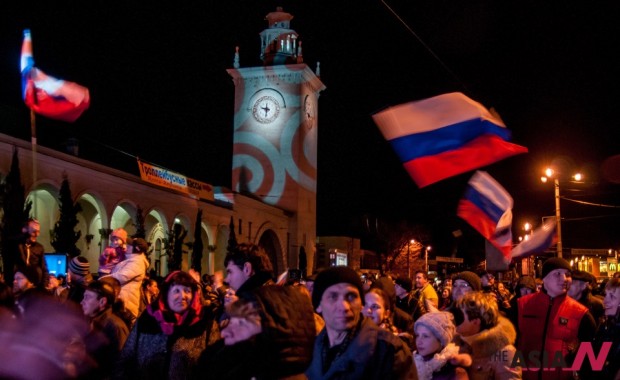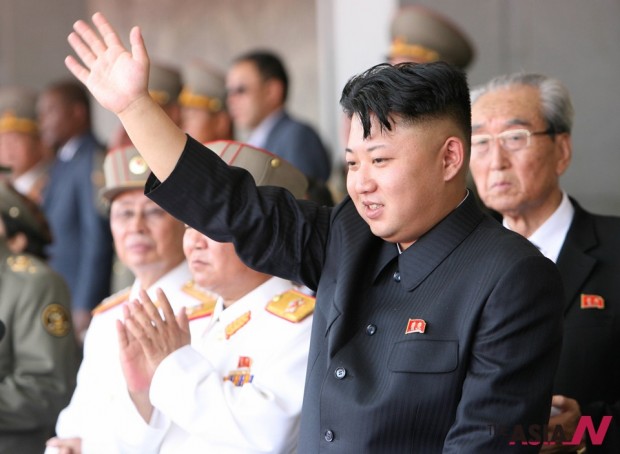Can South Korea unify North Korea by absorption?

On March 29, 2014, Russian flags flutter in the wind near a clock tower at a railway station during celebrations to mark the switch to Moscow time in Simferopol, Crimea. (Photo : AP/NEWSis)
Lessons to be learned from Crimean crisis
The unrolling Ukrainian crisis has been in the news a lot of late. The recent succession of Crimea can be seen in various ways, but it seems that this dramatic event hints at one possible scenario of Korea’s future.
Indeed, why did Crimea secede from Ukraine? Of course, Russian nationalism was much involved in these events – after all, Crimea is predominately an ethnic Russian region. However, there is another dimension as well: Crimea, and two million of its inhabitants, defected from an increasingly poor country to a country whose economy has experienced fast and steady growth.
It is not widely understood that a yawning income gap now separates Russia and Ukraine. According to the World Bank data, the per capita GDP in Ukraine is merely $3,800 while in Russia it is $14,000 – a nearly fourfold difference. Indeed, Ukraine is the only country of the former Soviet Union that has yet to recover from becoming an independent and post-socialist country – its GDP per capita remains, in real terms, lower than it was in 1990.
Such a large – and steadily growing – economic gulf, especially when combined with a dream of national unification, has always been potentially explosive. In 2014, as Ukraine experienced yet another revolution and turmoil in the capital city of Kiev, pro-Russian activists in Crimea saw their chance. They realized that the weakness of Kiev finally gave them the chance to unify with Russia and partake in the current Russian prosperity.
The parallels with Korea are obvious. Among other things, recent events in Crimea make one even more skeptical about the popular and widespread hope for a gradual, negotiated unification process between North and South Korea. It seems that any turmoil in the North will make North Korean public rush towards unification with the South, not merely successful, but also fabulously rich.
Indeed, when South Korean politicians talk about unification, they always take care to emphasize that they are not talking about German-style ‘unification by absorption, that they do not imply that their poor socialist neighbor would be swallowed by the much more successful capitalist state. Rather, they insist that future unification should be brought about by negotiations between the two existing Korean governments.
It is imagined in South Korea that the future unification will be a prolonged and slow process. It is also implied that even after the process has been initiated, North Korea will remain a separate entity for a long time to come. Moreover, it is implicitly assumed that the current government in Pyongyang (or its immediate successor) will remain in power in the North for the entire length of the unification process, and therefore the North will keep some of the most important features of its current Leninist (or rather Stalinist) political and economic systems.
It is clear why this dream has become so popular in South Korea nowadays. The experience of turbulent and expensive German unification was an extremely important object lesson for South Korea. Influenced by the German experience, as well as by growing realization of how poor and backward the North actually is, the South Korean public came to understand that the absorption of the North would be economically costly and socially very painful. Some experts put the likely cost of such exercise as high as $5 trillion – four or five times the sum of South Korea’s entire annual GDP. Other experts are more optimistic, but they still believe that the costs will be well in excess of one trillion dollars mark. It is therefore all too natural that many South Koreans, being terrified by such astronomic expenses, became interested in the idea of a more gradual unification process.
Alas, this dream of the immaculate conception of a unified nation is implausible at best. Gradual unification is likely to be completely unacceptable for the vast majority of North Koreans. Now the per capita GDP gap between two Korean state is at least 15-fold (perhaps, much higher). If the North Koreans will learn about the South Korean prosperity, still largely unknown to them, and if they become less fearful of their own government, they are not likely to wait another 20 or 25 years for the completion of the unification process.

Kim Jong Un, top leader of the Democratic People's Republic of Korea (DPRK), addresses the troops during a military parade held in Pyongyang, DPRK, July 27, 2013. (Photo : Xinhua/NEWSis)
Instead, initiation of a unification process is likely to create a rapid escalation of demands from the North Korean people, culminating in unification by absorption, i.e., the German-style. As Crimean events confirmed once again, the lure of prosperity is irresistible, especially when combined with dreams of national re-unification. Facing such a situation, the North Korean government will either bow to pressure from below and speed up the unification process, or it will be overtaken by such developments.
Once the North Korean people are more exposed to images of South Korean prosperity and become less fearful of their own government, they are very likely to do what East Germans did in 1989. It is often forgotten that the people who led the pro-democracy protests in East Germany at that time did not envision a speedy unification of the two countries. Initially, what they wanted was a reformed but recognizably socialist East German state. However, the dreams of left-leaning idealistic intellectuals were dashed by the East German people – who wanted to emulate West German prosperity fast.
Of course, it is possible that the North Korean government will, in the face of such a crisis, resort to the use of force in repressing pro-unification and pro-democracy groups. The Kim family and its loyalists might even succeed in restoring order and preventing collapse. The use of lethal force against its own people, however, will not leave a positive impression with South Koreans. Such measures are likely to result in the termination of all meaningful interactions between the two Korean states, let alone unification process. The South Korean public will hardly approve of a gradual unification with a regime willing to machine-gun protestors. So, even if the North Korean government wipes out resistance forces, it will not be able to save the idea of a gradual unification process.
Admittedly, though, all these are speculations, since the North Korean decision makers, being perfectly aware of the huge political risks associated with any attempt to move towards gradual unification, are unlikely to even consider such an option.
So, the gradual unification is a pipe dream. This does not necessarily mean that the present author is particularly fond of the idea of unification by absorption. Nonetheless, it seems that Koreas have little choice in the matter – the economic success of South Korea makes it an extremely attractive option vis-a-vis north of the DMZ. The South Korean “economic miracle” created a kind of powerful gravitational field that is likely to swallow the North instantly and at the first sign of instability there.
Korea faces only two realistic futures: either the continuation of the status quo or unification by absorption. However, the South Korean political establishment, as well as the South Korean opposition is remarkably reluctant to recognize the situation for what it is. They prefer not to tell voters that unification, when it happens, will be painful and extremely expensive. They also show reluctance to start seriously preparing for such a process, even though many of South Korea’s political elite are aware that the dream of a gradual unification is but a fantasy.
Nonetheless, sometimes it appears that South Korean politicians believe in the magic power of taboo. They behave as if by not thinking about the dreaded prospect of sudden unification they can actually prevent it from happening. This is clearly not the case, but this curious reluctance to admit the obvious might become a serious obstacle when the crisis actually comes.


























































